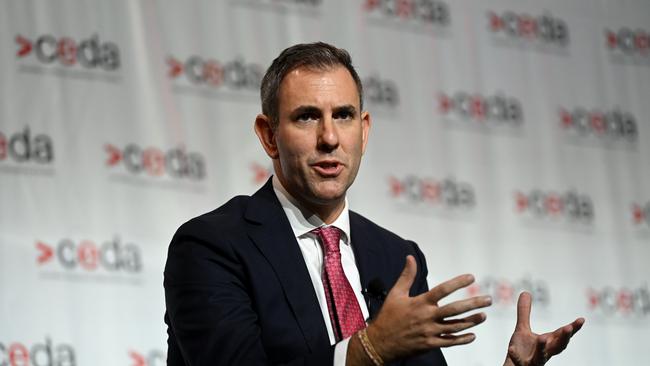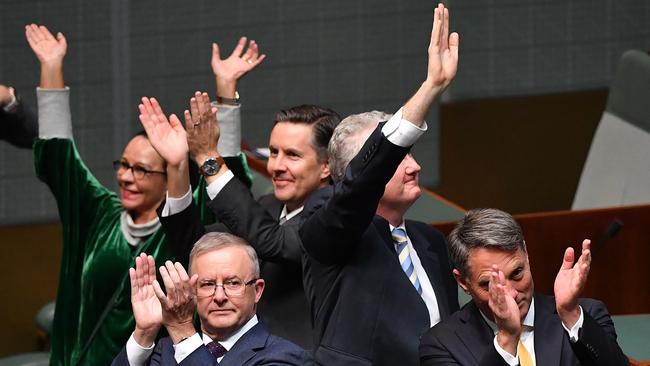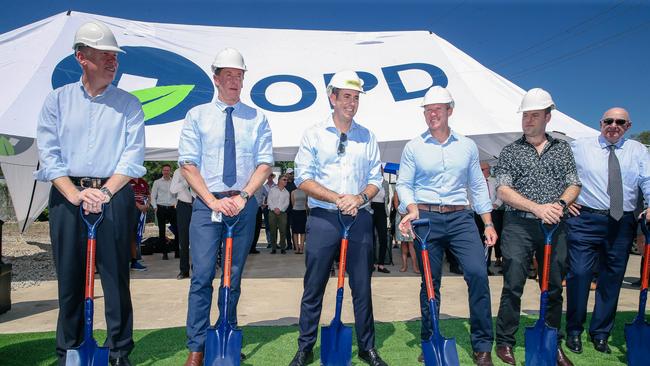
The heart of our predicament is that productivity has no constituency in this country, yet it will largely determine our future living standards. That’s a serious problem. Productivity has become a word devoid of any agreed meaning. This truth exposes the crisis in Australian governance – our democratic election contests are decoupled from the national interest outcomes the country needs.
We need productivity but there is no longer a path to its delivery. As Treasurer, Jim Chalmers is the latest inheritor of this national dilemma. Chalmers welcomed the PC report but then damned much of its thrust – on industrial relations, clean energy, and job and financial security, declaring Labor wouldn’t compromise “our priorities and our values”.

Is the PC a threat to Labor values? Many seem to say yes. The ACTU wants the Productivity Commission abolished. It is a forlorn institution within the government. The progressive chant is that the PC is a dinosaur from the failed age of neoliberalism. (Yes, the deluded progressive mantra actually believes Australia has been trapped in neoliberalism for decades).
Chalmers upheld the imperative for better productivity but has grave misgivings about the philosophy of the Productivity Commission itself. This reflects the cultural and economic changes sweeping through our elites, reflected in Chalmers’ recent 6000-word essay on the need for a new form of “values-based capitalism”.
The Commission has merely done its job with this latest report, titled “Advancing Prosperity”. There is a risk now of shooting the messenger. But there is another problem: such a government enshrined think tank must have influence if its institutional purpose is to be maintained. How many decision-makers will read the nine-volume PC report, or even its summary? How many will take the slightest notice?

The PC has got entangled in the ideological tensions between its brand of market-based economic reform and Labor’s search for a new brand of reform that goes to values. The Albanese government is yet to figure where it exactly locates on that spectrum.
Before and since the campaign, Chalmers has put productivity up in lights. That’s important. The easy and depressing part is sketching the bad news. The PC report documents a “seemingly entrenched slowdown” in productivity growth, with performance over the decade to 2020 the slowest in 60 years, falling to 1.1 per cent from 1.8 per cent over the past 60 years.
That has a huge impact on long-term prosperity – it means the time it takes economic output per person to double increases by 25 years. It means working longer hours for diminished gains. Better productivity creates the potential for higher wages and lower prices. As Chalmers said, if Australia stays stuck on the present course the PC projects future incomes will be 40 per cent lower and the working week 5 per cent longer. This must affect social life, economic equity and community stability.
If that’s the future, Labor fails, politically and morally.

There is no silver bullet to fix the problem. The nine volume PC report identifies reforms around five areas: a higher skilled workforce, the take-up of digital technology, a more dynamic economy via competition and tax reform, improving efficiency in government services and achieving net zero at least cost.
The Treasurer sends two messages. On the one hand he says the PC’s reform categories align “pretty closely” with his messages. One the other hand, he affirms his intent to change the way the Commission functions. Chalmers wants the “structure and remit” of the PC altered and has authorised a review to ensure it is “suited to the times”. He wants a more relevant commission, presumably more geared to Labor values.
The point is that “values-based capitalism” means a different approach to productivity. How could it not? In his essay Chalmers espoused an economy not run by a single narrative but clean, inclusive and resilient, focused “on the intersection between prosperity and wellbeing”, an economy that addressed disadvantage and inequality.
Addressing the PC report, Chalmers put a veto sign on two areas, revealing the chasm between the PC’s pro-market outlook and Labor political realism. As expected, the Commission calls for more labour market flexibility, reforms to boost enterprise agreements even if not everybody is better off, simplification of the award system and a warning against Labor’s multi-employer bargaining laws.

Labor rejects the Commission’s views on IR, sees them as pro-Liberal and pro-employer, and will not tolerate a freer labour market. Any productivity gains on that front are non-achievable.
On climate, the PC recommends the government’s safeguard mechanism – now before the parliament – be elevated to become the principal economy-wide emissions reduction mechanism. Given the many billions of dollars in investment needed to achieve net zero at 2050 and the 43 per cent emission reduction by 2030, the PC says the efficiency in delivering these goals “will be a major determinant of the living standards of all Australians”. It wants the “hodgepodge” of clean-energy measures and subsidies phased down or out.
But the special green interests and the political risks are too potent. Chalmers said: “We don’t believe productivity gains come from scorched-earth industrial relations, for example, or from abolishing clean-energy programs.” An economy-wide carbon price remains too much for Labor. What policy it takes to the next election is an open issue.
Chalmers knows he will be judged by the results – by whether living standards are increased. Meanwhile, BCA chief Jennifer Westacott warns Australia is suffering an investment drought and our ability to win from the big shifts to decarbonisation and digitisation is in doubt – yet that is Labor’s exact strategy.
The voters won’t pay ideology; they will pay results. Chalmers is devising a Labor approach to productivity still drawing upon much of the PC report but putting Labor’s stamp on the product. It constitutes the gains from the transition to clean energy, upgraded skills and training, a more efficient care sector and a priority on the digital revolution. Investment in people is vital; witness the cheaper childcare and better-paid parental leave initiatives. Will it deliver and break the cycle of decline?

“Australia’s economy has changed,” PC chair Michael Brennan said. “Almost 90 per cent of Australians now work in service industries, including education, health, hospitality, retail and finance. It has traditionally been difficult to lift productivity in these sectors.”
It raises a question: does the changed nature of capitalism, with economies now dominated by the services sector, mean we have entered a new epoch of weak productivity and reduced increase in living standards. Despite its techno-optimists, the digital revolution is still a flop at delivering across-the-board gains in productivity.
On display is the latest chapter in what has been a 25-year poisonous political contest over economic reform and productivity between the Coalition and Labor that has run across climate change, tax, industrial relations, fiscal priorities, health and education. The embittered politics has costly us big-time. And will that change?








The pressure on Australian living standards that the Albanese government has pledged to rectify now looms as a perilous political journey given the Productivity Commission five-yearly inquiry into how Australia’s prosperity can be improved.